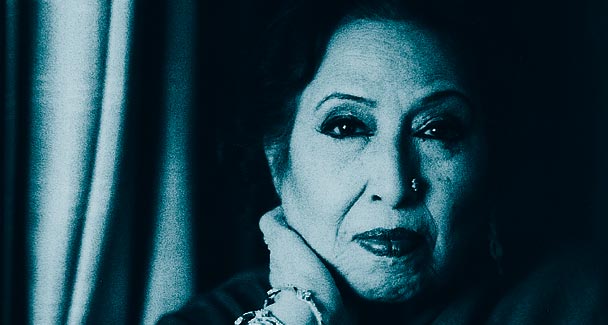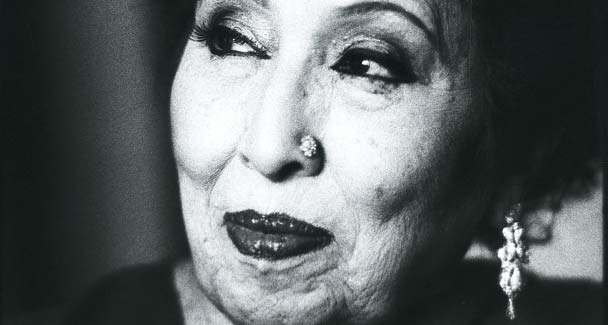
Iqbal Bano Passes Away, Her Ghazals Remain
, Memories & Ghazals
  |
| Inaam |
 May 12 2009, 09:34 AM May 12 2009, 09:34 AM
Post
#1
|
|
Dedicated Member  Group: Members Posts: 3602 Joined: 15-January 04 From: Pakistan Member No.: 187 |
 Iqbal Bano (1935-2009) A pupil of Ustad Chaand Khan, Bano was born in 1935 in Delhi. She moved to Pakistan in 1952 where she started her career with Radio Pakistan. She married a landlord the same year at age 17, who promised her that he would support her endeavors in music. Her first public concert was in 1957 at the Lahore Arts Council. Although she is known more for singing ghazals, particularly those of Faiz Ahmed Faiz, Bano also did playback singing for Pakistani films such as Gumnaam (1954), Qatil (1955), Inteqaam (1955), Sarfarosh (1956), Ishq-i-Laila (1957), and Nagin (1959). She was also awarded the Tamgha-i-Imtiaz (Pride of Performance) medal in 1974. ‘Iqbal Bano will always have a special place in the hearts and minds of our family,’ says Salima Hashmi, the daughter of the legendary Pakistani poet Faiz, whose verses the late singer rendered most eloquently. ‘She was one of the greatest means of support and inspiration during General Zia’s dictatorship,’ says Hashmi, recalling that in 1985, when there was an unspoken ban on reciting Faiz’s revolutionary poetry, Bano dared and performed ‘Hum Dekheingay!’ to an ecstatic audience. ‘I still remember the repeated requests of the charged listeners for an encore from that evening,’ she says. The song later became her anthem, which she would sing in all of her concerts to the delight of her many admirers. ‘In fact,’ says Hashmi, ‘it was Bano who started singing Faiz’s poetry for the first time in 1981 at a time when the poet himself was in exile in Beirut.’ Conveying her family’s heartfelt sentiments on the sad news of Bano’s demise, Hashmi says, ‘we all feel like a member of our own family has died today.’ For his part, sitar player Nafees Ahmed remembers Bano’s humble nature and sweet affection with fondness. He recorded several sessions with her in the studios as well as for PTV. ‘Even though she was a star performer, she remained loving and affectionate. She knew how to make a co-performer play the tunes, even if they didn’t want it to be played that way,’ he says. Artist Anwar Maqsood, who was also closely associated with the legendary singer, says that ‘no one will be able to forget her beautiful renditions, not only of Faiz’s poetry, but also Ghalib, Daagh and Nasir Kazmi.’ Maqsood points out that Bano’s talent lay not only in singing ghazals, but also in performing classical thumris. ‘Her command over the taal and sur of classical music was just perfect,’ he says. ‘Her passing is a great loss for us.’ Indeed, Bano will be missed both personally and professionally. Composer Arshad Mahmood, who worked closely with Bano during her recording sessions with the label EMI, recalls, ‘she was such a thorough professional, always very particular about what she was doing. I would enjoy watching her perform in the studio.’ Mahmood adds that ‘people like her didn’t sing out of compulsion, they sang because of a true passion for the arts.’ He recalls how, seven months ago, when she wasn’t keeping in good health, Bano declined to perform because she could not do justice to her voice. ‘She was a very good judge and would not settle for anything less than brilliance.’ And that brilliance is what will be missed most of all. As sitar player Ahmed puts it: ‘You know, before we would say that apart from Iqbal Bano, there’s no great ghazal singer left in Pakistan. But today, unfortunately, we can’t even say that anymore’.  Coming from a family of rigid social customs, Iqbal Bano was an icon of the typical style of ghazal singing, making her style known not only throughout the country but across borders. She ranks among the few vocalists who will be remembered as a symbol of ghazal singing at a time when Pakistan had none. The Rhotak-born Iqbal Bano had no taste for music when she was growing up in Multan. Then came the day when she went to meet a friend in the neighbourhood and came across her learning how to sing. She also began humming along and drew the attention of the ustad who told her that she had a good voice and could become a good vocalist. When she told her parents they refused her demand to learn music and stopped her from visiting her friend’s house. In Lahore she was allowed to visit Radio Pakistan to participate in a children’s programme. The composer gave her a song and led the rehearsal which she did well, and the song was put on the air. Seeing her interest and skill she was allowed to learn music and she became the disciple of Ustad Chaand Khan of the Delhi school. When her teacher passed away, she was taken under the tutelage of Ustad Karim Khan of Patiala. Being an intelligent student she picked up the minutiae very quickly and in the early 1950s began giving public performances in ghazal and thumri. Since her training was based on classical music, she sang ghazal in thumri ung. At that time Ustad Barkat Ali, Muktar Begum and Begum Akhtar were popular ghazal names and to create a place of her own was a daunting task. But Iqbal did it and opted for Punjab ung, making it distinctive than the Poorbi ung of Begum Akhtar. Since she had not discontinued her music studies, she could pay proper attention to reflect the emotions expressed in the lyrics, and by rendering correct pronunciation she could make it a beautiful presentation. In her classical style of music, the ghazal became an enchanting combination of poetry and music. When the film world came to know about her, Master Inayat Hussain approached her to sing a song for the film Gumnam, written by Saifuddin Saif. It was: Payal mein geet hain chham chham ke, tu lakh chale ri gori tham tham ke. The song was okayed in the first take and it led her further into the world of playback singing for films. In the meantime, she also picked out classical and contemporary poets and sang their ghazals. She has sung Ghalib, Ahmad Faraz, Faiz, Qateel Shafai and Hafeez Hoshiarpuri. When Mehdi Zaheer was to get Faiz’s poem Dasht-i-tanhai recorded, he proposed Iqbal Bano as the vocalist and she rendered it so well that even Faiz praised it. At a concert when she sang Faiz’s ghazal: Tum aaye ho na shab-i-intizar guzri hai, talash main hai sahar baar baar guzri hai. Faiz himself walked over to the stage and told her that he was the poet whom she was singing. As a background singer she made a remarkable contribution. She has sung in some 70 films and almost every song has earned her applause. When she was asked to sing Qateel Shafai’s ghazal: Ulfat ki naye manzil ko chala, tu banhein daal ke banhoon mein. It became an instant hit. Singing for films was an experience which she wanted. But ghazal, in her typical style and without confining it to time and space, she performed so overwhelmingly well that she became a class in herself. She made it sparkle with emotions, creating an aura of the finer sentiments and embellished every stanza with her subtle nuances. Her strenuous practice made her sonorous voice so magnificent that she would carve out a statue of brief glides, warbles and trills. This made the lyrics live to the heart of the listeners. When she visited India under the Saarc programme, she received a warm welcome there and during all her performances people thronged to the venue to full capacity. She was presented with three awards, namely the Sarmani Award, Naushad Award and Natraj Award, besides getting an offer to become a citizen of India which she politely declined. Iqbal did not belong to the school of vocalists who depend on composers. But this did not stop her from accepting good compositions. Among the composers with whom she enjoyed singing were Master Manzoor, Master Inayat Hussain, Safdar Hussain, Firoz Nizami, Khurshid Anwar, Mehdi Zaheer and Buland Iqbal. For her services she was been awarded the Pride of Performance and Sitara-i-Imtiaz. In the field of ghazal singing she was one of the most popular vocalists. In the ghazal tradition that has been retained by Mukhtar Begum, Begum Akhtar, Mehdi Hasan and Farida Khanum, Iqbal Bano has earned a place for herself very few can boast of. |
| Inaam |
 May 12 2009, 09:53 AM May 12 2009, 09:53 AM
Post
#2
|
|
Dedicated Member  Group: Members Posts: 3602 Joined: 15-January 04 From: Pakistan Member No.: 187 |
Sharing few of her popular Ghazals/Geets.
Daagh-e-Dil Humko Yaad Aane Lage... Duration: 05:00 128kpbs |
| ushas |
 Sep 13 2009, 02:54 PM Sep 13 2009, 02:54 PM
Post
#3
|
|
Newbie  Group: Members Posts: 7 Joined: 21-July 09 Member No.: 130070 |
Realy it is a sad for all music fans.
|
| hira |
 Dec 9 2009, 01:59 AM Dec 9 2009, 01:59 AM
Post
#4
|
|
Regular Member  Group: Members Posts: 318 Joined: 10-June 07 From: pakistan Member No.: 16530 |
Daag e dil humko yaad aane lage
singer - Iqbal Banu Duration - 5 min Bitrate - 128 KBPS |
  |
1 User(s) are reading this topic (1 Guests and 0 Anonymous Users)
0 Members:

|
Lo-Fi Version | Disclaimer | HF Guidelines |  |
Time is now: 20th April 2024 - 03:14 AM |
Invision Power Board
v2.1.7 © 2024 IPS, Inc.
Licensed to: Hamaraforums.com









